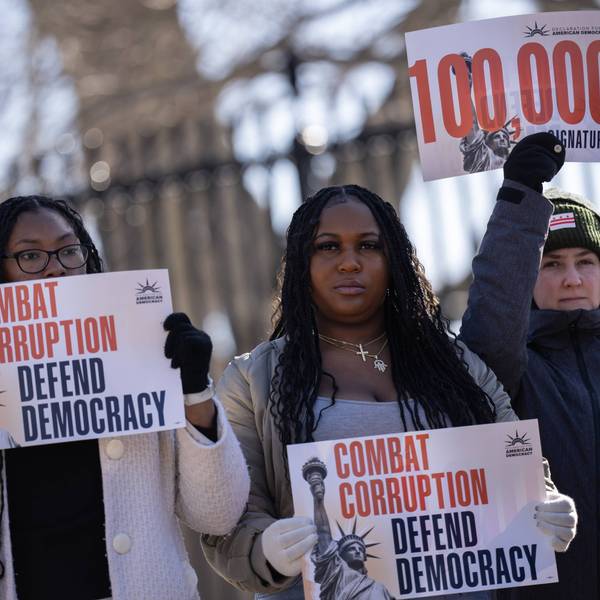Jeffrey Ballinger meet Aneel Karnani.
Ballinger
is the father of the movement to tame Nike.
In
1992, he wrote the first expose of Nike's abusive labor policies.
Ballinger
believes that the corporate social responsibility movement undermined Nike contract
workers' demands for a decent wage.
Aneel
Karnani is an associate professor of business strategy at the Ross School of
Business at the University of Michigan.
Last
month, the Wall Street Journal published a long article by Karnani
titled - "The
Case Against Corporate Social Responsibility."
In
short, Ballinger is a labor activist.
And
Karnani is a capitalist.
They
come at the issue from different angles - but they end up at the same
place.
"Nike
did a remarkable job of reversing its sweatshop image at a relative bargain
basement price compared to having contract sweatshops pay its workers a living
wage," Ballinger told us recently. "They did this through corporate
social responsibility hoo-ha costing maybe $15 million a year."
I read
the Ballinger quote to Karnani.
And
amazingly, he agrees.
"Corporate
social responsibility has been used by companies to ward off both the activists
and to reduce the probability of more onerous government regulation,"
Karnani told Corporate Crime Reporter in an interview last week.
"It's
greenwash. The United Nations has something called its Global Compact. It's
their version of corporate social responsibility. Many people call that bluewash,
because blue is the color of the United Nations."
"And
companies pretend to be socially responsible, but they really don't do
very much. This keeps the activists at bay. And it might serve to keep government
regulators at bay by saying - see, we are doing it on our own."
"We
should not expect companies to be socially responsible on their own if it is
going to reduce their profits."
"And
that's always the case in market failures. And there we need government
intervention."
The
famed economist Milton Friedman argued in a seminal paper that "The Social
Responsibility of Business Is to Increase Its Profits."
Aneel
Karnani agrees with Friedman - unless the market fails.
When
the market fails, Karnani would impose government regulation.
"Milton
Friedman underestimates these situations where there are market failures,"
Karnani said.
"So,
I would diverge from Milton Friedman. There are many situations where markets
fail. And when markets fail, we cannot rely on the invisible hand to provide
social welfare. We need to intervene - we meaning the government. We need
to intervene to achieve social objectives."
So,
you like Ralph Nader? Crack down on corporate crime and violence?
"I
wouldn't go that far," Karnani says. "Ralph Nader is too far
left. I don't want to intervene that much. I am a capitalist. Many of
my colleagues think I'm too far to the left because I see market failures.
But I don't see them everywhere."
"Food
is an interesting example. There are market failures in food. And we do need
regulation. But I don't want the government to ban McDonald's. There
are people who choose to eat at McDonald's. Knowing that eating burgers
everyday is going to make you fat is no secret. And I don't see that a
law is necessary to prevent people from eating burgers."
What
about increasing the budget to crack down on health care fraud from one tenth
of one percent of health care expenditures to one percent?
"I
think that's a good idea. I'm not familiar with the numbers on health
care fraud," Karnani says. "But the government needs to play a larger
role. Free markets by themselves are not going to work. That's where Milton
Friedman and his followers underestimate market failures. In the modern society,
market failures have increased."
"There
is more potential for market failures and therefore a larger role for the government.
But we need to make the government more competent. We cannot continue with the
same inefficient, corrupt, incompetent government."
"The
dumbest thing to do is to have laws that we don't enforce."
I read
to Karnani a strategy put forth by the public relations spy firm Mongoven, Biscoe
and Duchin (MBD).
MBD
works to divide and conquer activist movements, MBD believes that activists
fall into four distinct categories: radicals, opportunists, idealists, and realists.
MBD outlines a three-step strategy: isolate the radicals, cultivate the idealists
and educate them into becoming realists, then co-opt the realists into agreeing
with industry.
"This
seems even more cynical than I am about corporate social responsibility,"
Karnani says. "This is good grounds to be even more cynical. Companies
have figured out how to isolate the activists."
[For
a complete transcript of the Interview with Aneel Karnani, see 24 Corporate
Crime Reporter 34(10), September 6, 2010, print
edition only.]



